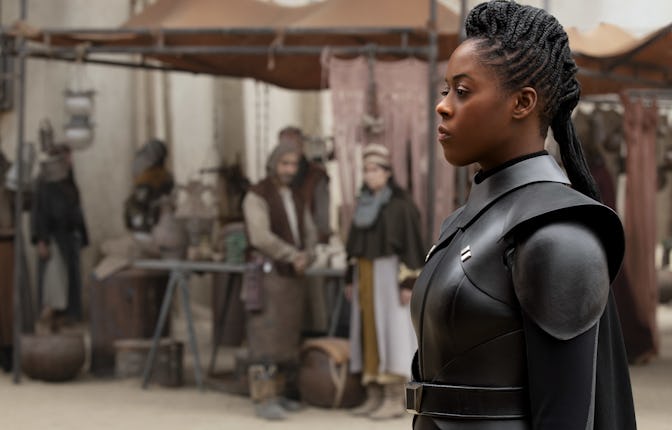What can ‘Star Wars’ do about its racism problem?
‘Obi-Wan Kenobi’ star Moses Ingram was flooded with racist tweets, similar to previous actors like John Boyega and Kelly Marie Tran.

It took very little time before the racism hit the fan. Shortly after the May 27 premiere of Obi-Wan Kenobi, actress Moses Ingram was flooded with racist messages online. Ingram, who stars as Inquisitor Reva on the hunt for Obi-Wan in the new Disney+ Star Wars series, screenshotted messages from people online calling her racial slurs, threatening her, and calling her a diversity hire.
“Long story short, there are hundreds of those. Hundreds,” Ingram said in an Instagram video. “And I also see those of you out there who put on a cape for me and that really does mean the world to me because, you know, there’s nothing anybody can do about this. There’s nothing anybody can do to stop this hate. And so I question my purposes even being here in front of you saying that this is happening.”
Lucasfilm, where executives apparently had warned Ingram about the treatment she would receive, did attempt to offer a helping hand. “We are proud to welcome Moses Ingram to the Star Wars family and excited for Reva’s story to unfold. If anyone intends to make her feel in any way unwelcome, we have only one thing to say: we resist,” the official Star Wars account tweeted on Sunday night. “There are more than 20 million sentient species in the Star Wars galaxy, don’t choose to be a racist.”
This kind of racist hate “was something that Lucasfilm actually got in front of, and said, ‘This is a thing that, unfortunately, likely will happen. But we are here to help you; you can let us know when it happens,'” Ingram told The Independent earlier this month. The tweets are ostensibly the company’s attempt to make good on their promise to protect Ingram, but it comes off as both largely useless (racist trolls are unlikely to be deterred by a couple of corporate tweets) and also somewhat disingenuous considering their history with stars like John Boyega and Kelly Marie Tran, two non-white stars from the latest Star Wars trilogy that were subject to similar forms of repeated online harassment.
The entire experience back then was a striking example of just how flimsy the concept of “representation” is, particularly when it’s being churned out by a mega-corporation. Not only was the industry “unprepared,” as Boyega put it in an interview, for a character like his. It in fact ultimately catered to racist backlash: Boyega and Tran’s roles were heavily and suspiciously pared-down across the trilogy. Representation extends only as far as the fandom’s dollar does.
“What I would say to Disney is do not bring out a black character, market them to be much more important in the franchise than they are and then have them pushed to the side. It’s not good. I’ll say it straight up,” Boyega said to British GQ in a story published in September 2020. He referenced the trilogy’s nuanced focus on Daisy Ridley and Adam Driver’s characters, while ultimately tossing others aside: “You knew what to do with these other people, but when it came to Kelly Marie Tran, when it came to John Boyega, you know fuck all.”
Granted, there is a broader, bleak truth within Ingram’s resignation to her situation — there’s little even a company like Disney can do to stop racism online — and one can see not only the tweets defending Ingram, but her casting to begin with, as a corrective from Disney to handle things differently this time around. (Although, with Obi-Wan Kenobi being a miniseries, Ingram’s role is set in stone — who’s to say how her character arc would have been handled in an ongoing series following the online hate.)
This kind of change may also be a direct result from Boyega’s own efforts. After his public comments to GQ, a Disney executive reached out to him, leading to “a very honest, very transparent conversation.” “There was a lot of explaining on their end in terms of the way they saw things,” he told The Hollywood Reporter. “They gave me a chance also to explain what my experience was like. I’d hope that me being so open with my career, at this stage, would help the next man, the guy that wants to be the assistant DOP, the guy that wants to be a producer. I hope that the conversation is not such a taboo or elephant in the room now, because someone just came and said it.”